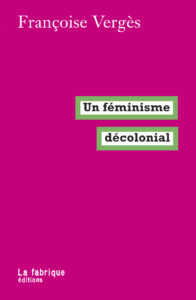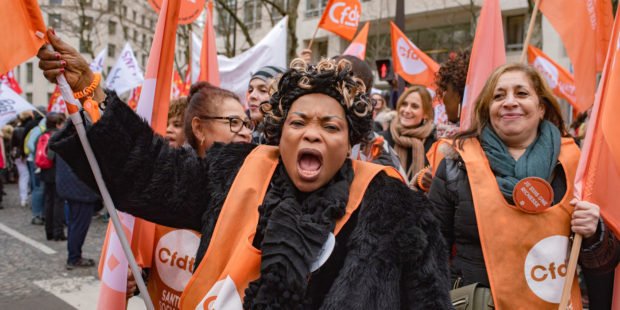The French feminist Françoise Vergès presented in Rabat her last book “Un féminisme décolonial”. Through it, the author explained how the European feminism has become, on many occasions, a neoliberal concept that tries to carry out a “civilizing mission among the societies and women of the South”, especially among Muslims, in what could be considered a neocolonialist style.
“Before, feminism was considered almost an insult, something marginal, but now everybody considers themselves feminists, even the far right has adopted this concept in its discourses. Feminism has become a good”, says Françoise Vergès.
Last March 14th, she presented her recently published book “Un féminisme décolonial” in Rabat, Morocco. The event, organized by the International University of Rabat and the Jacques Berque Center, was highly attended, especially by students.
 Vergès, in a clear and well-structured communication, explained the methodology that led to the publishing of this books. She explained how the events taking place during the last decades had encouraged her to study feminism from a de-colonial perspective, especially focusing on the French case, which was often the forerunner of the ideologies that would afterwards spread through Europe.
Vergès, in a clear and well-structured communication, explained the methodology that led to the publishing of this books. She explained how the events taking place during the last decades had encouraged her to study feminism from a de-colonial perspective, especially focusing on the French case, which was often the forerunner of the ideologies that would afterwards spread through Europe.
We could recently read an open letter in the French weekly magazine Le Point, signed by many French scholars, which alerted against the use of terms such as “de-colonial”, or related concepts such as “race” or “islamophobia”, claiming that it was undermining the peoples’ coexistence and highlighting their differences.
“‘De-colonial’ seminars, exhibitions, shows, films, books, that reactivate the idea of ‘race’ keep stressing the guilt of one part, and the resentment of the other part, feeding the interethnic hates and divisions.”
Imaginary representations
However, for Vèrges, issues related to race do not belong to the past, but are still present in today’s affairs. “We are not only referring to imaginary representations, but to political strategies. For this reason, when I speak of French politics, I don’t refer to racial questions, but to ‘racialized’ issues. Likewise, I don’t speak of feminism from the perspective of a victimized women, nor do I refer only to her rights. The category of women isn’t universal nor general.”
As an example, the French feminist cited the recent successful 45-days strike carried out by the cleaning women workers at the North Station, in Paris. Most of these women were foreigners, many of them Syrian refugees, so the conflict was “racialized”. The strike aimed at reporting, not only the harsh working conditions, but also the many sexual abuses they frequently experienced. After the strike, a feminist movement was created, led by important figures such as actress Catherine Deneuve, under the slogan “The right to be bothered”. This initiative, however, minimized the seriousness of the abuses to these and other women, especially from the South.
Birth control and domination policies
 In the 70s –explained Françoise Vergès- France and the US introduced in their policies the notion of the danger represented by the overcrowded “third world”, and, thus, of the need for birth control, frequently against their will and by methods considered aggressive. All of this was related with the migration policies, the need for foreign labor forces, etc. “That’s what I call a “racialized” policy, and an abuse of power on the women’s body. They are domination policies developed after the Second World War”.
In the 70s –explained Françoise Vergès- France and the US introduced in their policies the notion of the danger represented by the overcrowded “third world”, and, thus, of the need for birth control, frequently against their will and by methods considered aggressive. All of this was related with the migration policies, the need for foreign labor forces, etc. “That’s what I call a “racialized” policy, and an abuse of power on the women’s body. They are domination policies developed after the Second World War”.
Colonialism and oblivion
When we look at the groundbreaking French women’s liberation movements, Vergès noted that all of them ignored the colonization issue, they just reported the abuses. As the Martinican poet and politician, Aimé Césaire, asked: “why has the European feminism never taken into account colonization?”
 The authoress also highlighted how, after the Algerian independence, in 1962, and during the 70s, France forgot to mention or remember colonialism again. Likewise, from 1975 to 1977, appeared a movement of intellectuals that claimed against the French Revolution. They reported, not only the practice of Revolution, but the whole idea of it, by relying in the Bolshevik revolution in Russia and the creation of Gulags, or Castro’s revolution in Cuba and its consequences.
The authoress also highlighted how, after the Algerian independence, in 1962, and during the 70s, France forgot to mention or remember colonialism again. Likewise, from 1975 to 1977, appeared a movement of intellectuals that claimed against the French Revolution. They reported, not only the practice of Revolution, but the whole idea of it, by relying in the Bolshevik revolution in Russia and the creation of Gulags, or Castro’s revolution in Cuba and its consequences.
Following this line, Vergès explained how, during the 80s, appeared an “anti anti-colonization” movement, that insisted in the benefits of colonization and the problems and dictatorships that the de-colonialism process had led to.
Islamophobia and feminism
Vergès also explained how, after the first neoliberal interventions in Central America, came the first Islamophobic policies in France. In 1989, took place the first case of expelling of students for dressing with a hijab, at a high school in Creil. The most interesting thing is that, after this event, anti-colonialist and left-wing feminists, such as Giselle Amini, began to present Islam and Muslim men as oppressors and patriarchal, and the Muslim women as submissive victims that needed to be saved.
This led to the rising of a new narrative that confronted Islam and Muslims directly, and which could be found in editorials, articles and open letters. The idea of the “European values threatened” gains strength, just as the idea of the need to free the Muslim women oppressed by the veil. And here, states Vergèl, “the Right and the Left converge on this civilizing mission”.
 It is not just a “white and bourgeois” discourse, because it is also adopted by many women in the South, but “neoliberal and civilizing”. “There is a need to civilize the societies of the South, especially its women. Or as philosopher Franz Fanon used to say, “Take women and the rest will come voluntarily”.
It is not just a “white and bourgeois” discourse, because it is also adopted by many women in the South, but “neoliberal and civilizing”. “There is a need to civilize the societies of the South, especially its women. Or as philosopher Franz Fanon used to say, “Take women and the rest will come voluntarily”.
To sum up, Françoise Vergès explained during the presentation of her last book that that the goal of the decolonial feminism she defends is to reach a world without injustices, free of colonizing ideas and mindsets.
Inés Eléxpuru, Director of Communication of the Islamic Culture Foundation















No Comments